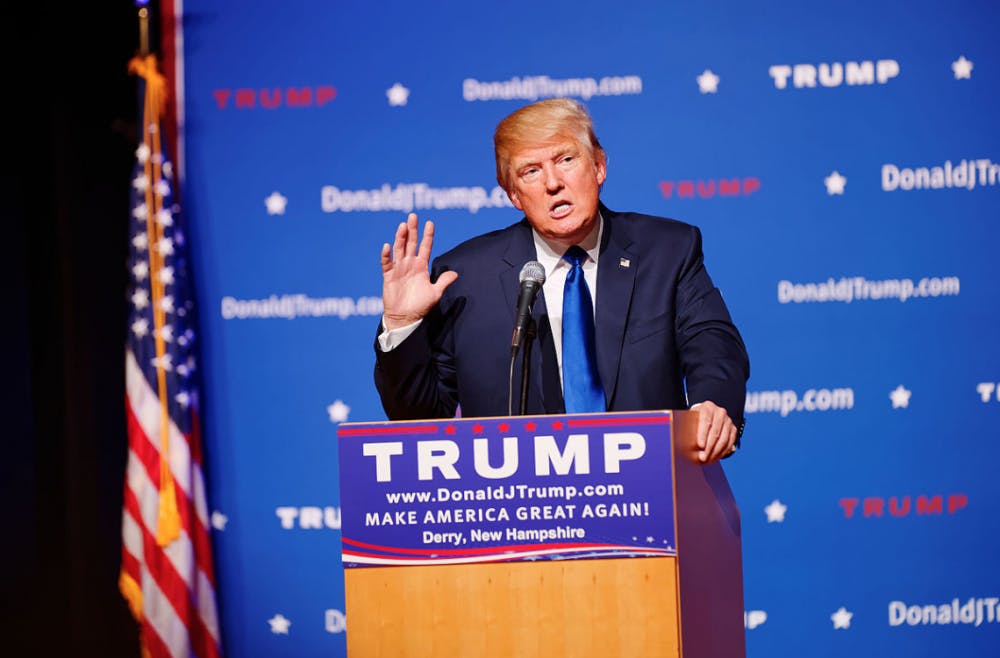After the 2016 Republican National Convention, members of the Duke community are weighing in on the unification of the party and divisive moments during the convention.
The RNC was held over the past four days in Cleveland, Ohio, a battleground state in the general election. Major speakers included Trump’s wife and children, former presidential candidate Ben Carson, former Speaker of the House Newt Gingrich, Gov. Chris Christie and Gov. Mike Pence, whom Trump announced as his running mate last Friday. Since the day before the convention, Trump has seen a small bump in the polls, narrowing the gap between him and presumptive Democratic nominee Hillary Clinton to two points, according to polling aggregation website FiveThirtyEight.
“There are already some people that have been very clear that they are not going to support [Mr. Trump],” said Alabama Rep. Bradley Byrne, Trinity ’77. “So, I don’t expect the convention, at this point, to change the mind of someone who has made a hard and clear statement like that. But there are others out there that really haven’t made up their minds. I think [the convention] will largely unite the party.”
Monday's events—which focused on the theme “Make America Safe Again"—featured headliners including Gov. Rick Perry and Melania Trump, whose speech contained sections similar to First Lady Michelle Obama’s 2008 Democratic National Convention speech. Shortly after the controversy arose, Trump staff member Meredith McIver took responsibility for writing the speech and came forward with her resignation, which Trump refused.
Also on Monday, the RNC delegates adopted the rules proposed by convention’s Rules Committee, which outlined how the delegates would vote. A group hoping to unbind the delegates from their state results created a commotion, as a last ditch effort to stop a Trump nomination. Jill Homan, a Republican national committeewoman for D.C. and Fuqua '06, noted that the delegates who wanted to prevent the nomination were a small minority.
“It’s nowhere near chaos,” Homan said. “You have some procedural moves that a minority group of people were trying to get to people to sign on and that failed. I think that shows a lot more support for Donald Trump than people who are trying to do something else or come up with an alternative.”
Byrne explained that there are a diversity of views in the Republican party due to its size, which has also increased its electoral success. The party holds the majority of governorships and state legislature positions and the majority in the House of Representatives and Senate.
“We enjoyed a lot of electoral success over the last couple of years and that’s because we are a big tent party,” Byrne said. “We have people that are anywhere from moderate to extremely conservative and that’s a sign of a very healthy party.”
Tuesday—entitled “Make America Work Again”—included speeches from Senate Majority Leader Mitch McConnell, Trump’s children Tiffany Trump and Donald Trump, Jr. and Sen. Shelley Moore Capito, Trinity ’75.
“Ladies and gentlemen, we face challenging times,” Capito said in a speech at the convention. “Times in which we as leaders must ask how we can secure a future that’s brighter for our next generation.”
McConnell led the convention's formal nomination of Trump and Pence, which Trump accepted Thursday.
Key speakers Wednesday—which was centered around the theme “Make America First Again”—included Trump’s son Eric Trump, Pence and Sen. Ted Cruz, who received booing from the crowd for not formally endorsing Trump. Cruz told the Texas delegation Thursday that he would not endorse someone who insulted his wife and father.
“Cruz’s speech Wednesday night made it clear that personality is much harder to unify behind than policy,” wrote sophomore Alec Lintz, a registered Republican, in an email. “The primary season was a nightmare of personal slurs and emotions between candidates which evaded dialogue on the real policy issues at hand in our party. Now we’ve missed an entire election season’s worth of policy discourse, and there’s a great portion of the party that just can’t support Donald Trump, not because of his policies, but because of the persona he’s created for himself."
Thursday—entitled “Make America One Again”—featured Trump’s daughter Ivanka Trump, Republican National Committee chairman Reince Priebus and Trump as speakers.
"The most important difference between our plan and that of our opponents, is that our plan will put America first. Americanism, not globalism, will be our credo," Trump said during his acceptance speech. "As long as we are led by politicians who will not put America first, then we can be assured that other nations will not treat America with respect—the respect that we deserve. The American people will come first once again."
Notable leaders of the party missing from the convention included all living former Republican presidents, former Gov. Jeb Bush, 2012 nominee Mitt Romney, and Gov. John Kasich, who decided not to attend despite being in Ohio. All in all, more than 20 senators, six governors and dozens of representatives chose not to be present.
Despite the blunders and discord, Trump now has the slightly higher chance of winning Ohio, when only last week Clinton held the state, according to FiveThirtyEight. The polling aggregation website also reports that Trump widened his vote in North Carolina to almost two points since the convention began.
“I don’t think that this election is going to be decided before Election Day,” Byrne said. “We can’t know, even with the polling because we have such a volatile electorate right now and we’re not even sure who’s going to turn out to vote.”
Get The Chronicle straight to your inbox
Signup for our weekly newsletter. Cancel at any time.
Class of 2019
Editor-in-chief 2017-18,
Local and national news department head 2016-17
Born in Hyderabad, India, Likhitha Butchireddygari moved to Baltimore at a young age. She is pursuing a Program II major entitled "Digital Democracy and Data" about the future of the American democracy.

